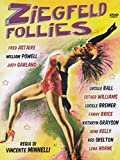![Spiceworld The Movie [1997]](/pictures/1011833.jpg) Spiceworld The Movie | DVD | (17/04/2019)
from £23.99
| Saving you £-14.00 (N/A%)
| RRP
Spiceworld The Movie | DVD | (17/04/2019)
from £23.99
| Saving you £-14.00 (N/A%)
| RRP The girl's first live concert at the Royal Albert Hall is in just five day's time. With trusty bus driver Dennis (Meatloaf) at the wheel they hurtle from guest appearances to parties photoshoots and even dance camp! But when evil tabloid editor Kevin McMaxford steps up his campaign against them their best friend goes into labour and their manager collapses in hysterics the girls must draw on all their Girl Power to make it to the show on time...
![Swing Time [1935]](/pictures/1037486.jpg) Swing Time | DVD | (10/04/2006)
from £14.65
| Saving you £-4.66 (N/A%)
| RRP
Swing Time | DVD | (10/04/2006)
from £14.65
| Saving you £-4.66 (N/A%)
| RRP A glorious songburst of gaiety and laughter! Fred Astaire and Ginger Rogers star in arguably their finest film together; packed with exhilarating dance routines and a marvellous score this is an indispensable musical classic! Swing Time is full of magical moments including a complex and delightful routine to Pick Yourself Up a luminous turn to Waltz In Swing Time and Astaire's breathtaking solo to Bojangles Of Harlem.
 Fred Astaire - Screen Legends | DVD | (05/06/2006)
from £19.41
| Saving you £5.58 (28.75%)
| RRP
Fred Astaire - Screen Legends | DVD | (05/06/2006)
from £19.41
| Saving you £5.58 (28.75%)
| RRP One of the greatest music and dance stars in the history of motion pictures Fred rose from a fairly inauspicious start where a studio exec remarked: ""Can't sing. Can't act. Slightly balding. Can dance a little."" Well his career and achievements speak for themselves. A remarkable talent this box set features 4 of his most-loved films. You'll Never Get Rich (Dir. Sidney Lanfield 1941): After his wife discovers a telltale diamond bracelet impresario Martin Cortland tries to
![Make Way for Tomorrow (1937) (Criterion Collection) UK Only [Blu-ray] [2022]](/pictures/1158550.jpg) Make Way for Tomorrow (1937) (Criterion Collection) UK Only | Blu Ray | (25/04/2022)
from £22.98
| Saving you £N/A (N/A%)
| RRP
Make Way for Tomorrow (1937) (Criterion Collection) UK Only | Blu Ray | (25/04/2022)
from £22.98
| Saving you £N/A (N/A%)
| RRP Make Way for Tomorrow, by LEO McCAREY (An Affair to Remember), is one of the great unsung Hollywood masterpieces, an enormously moving Depression-era depiction of the frustrations of family, aging, and the generation gap. BEULAH BONDI (It's a Wonderful Life) and VICTOR MOORE (Swing Time) headline a cast of incomparable character actors, starring as an elderly couple who must move in with their grown children after the bank takes their home, yet end up separated and subject to their offspring's selfish whims. An inspiration for Yasujiro Ozu's Tokyo Story, this is among American cinema's purest tearjerkers, all the way to its unflinching ending, which McCarey refused to change despite studio pressure. Special Features High-definition digital restoration, with uncompressed monaural soundtrack Tomorrow, Yesterday, and Today, an interview from 2009 featuring filmmaker Peter Bogdanovich discussing the career of director Leo McCarey and Make Way for Tomorrow Video interview from 2009 with critic Gary Giddins, in which he talks about McCarey's artistry and the political and social context of the film PLUS: A booklet featuring essays by critic Tag Gallagher and filmmaker Bertrand Tavernier, and an excerpt from film scholar Robin Wood's 1998 piece Leo McCarey and Family Values
![We're Not Married [1952]](/pictures/1039408.jpg) We're Not Married | DVD | (22/05/2006)
from £6.22
| Saving you £6.77 (108.84%)
| RRP
We're Not Married | DVD | (22/05/2006)
from £6.22
| Saving you £6.77 (108.84%)
| RRP In separate stories five wedded couples learn that they are not legally married...
![Seven Year Itch [1955]](/pictures/1065913.jpg) Seven Year Itch | DVD | (22/05/2006)
from £7.90
| Saving you £5.09 (64.43%)
| RRP
Seven Year Itch | DVD | (22/05/2006)
from £7.90
| Saving you £5.09 (64.43%)
| RRP When a seductive starlet moves in upstairs a married man (Tom Ewell) has his fidelity put to the test. Keeping his marriage vows in the face of her flirtations proves hilariously tough when challenged by the notorious ""Seven Year Itch""!
 Ziegfeld Follies (1946) | DVD | (26/02/2015)
from £15.21
| Saving you £N/A (N/A%)
| RRP
Ziegfeld Follies (1946) | DVD | (26/02/2015)
from £15.21
| Saving you £N/A (N/A%)
| RRP ![Ziegfeld Follies [Blu-ray]](/pictures/1155827.jpg) Ziegfeld Follies | Blu Ray | (15/06/2021)
from £N/A
| Saving you £N/A (N/A%)
| RRP
Ziegfeld Follies | Blu Ray | (15/06/2021)
from £N/A
| Saving you £N/A (N/A%)
| RRP  MAKE WAY FOR TOMORROW (Masters of Cinema) Dual Format (Blu-ray + DVD) | Blu Ray | (14/11/2011)
from £N/A
| Saving you £N/A (N/A%)
| RRP
MAKE WAY FOR TOMORROW (Masters of Cinema) Dual Format (Blu-ray + DVD) | Blu Ray | (14/11/2011)
from £N/A
| Saving you £N/A (N/A%)
| RRP Of Make Way for Tomorrow, Orson Welles told Peter Bogdanovich: “Oh my God that’s the saddest movie ever made.” Leo McCarey’s personal favourite among all his films (which included The Awful Truth and An Affair to Remember) is sad, yes, but it also stands as cathartic affirmation of the dignity of human feeling, and in the testament of such achieves a subtle complexity of characterisation on par with Renoir, Ford, and Hawks. Victor Moore and Beulah Bondi, two of the great Hollywood character actors, portray the couple whose house the bank has foreclosed upon, and who are forced subsequently to move into their children’s homes in the city. A near-musical restructuring of gratitude and debt ensues once the offspring deem the couple’s lodging an imposition: the two are separated, then reunited weeks later... as they glide inexorably into an uncertain future. Unrelentingly unsentimental, Make Way for Tomorrow exerted a powerful influence on Ozu’s Tokyo Story and several other key entries in the Japanese master’s body of work. It is a film that, to give Welles the last word, “could make a stone cry.” The Masters of Cinema Series is proud to present Leo McCarey’s truly great Make Way for Tomorrow for the first time on Blu-ray anywhere in the world, as part of this Dual Format (Blu-ray + DVD) edition. Dual Format Edition Including: Newly restored 1080p HD encode in the film’s original aspect ratio Peter Bogdanovich discussing McCarey and the film [20:00] Gary Giddins discussing the film’s social and political contexts [21:00] Optional English subtitles (SDH) for the deaf and hearing-impaired 36-PAGE BOOKLET featuring a new essay by writer Geoffrey O’Brien and an excerpt from Josephine Lawrence’s source novel Years Are So Long
![Choices [1981]](/pictures/1053411.jpg) Choices | DVD | (21/06/2004)
from £N/A
| Saving you £N/A (N/A%)
| RRP
Choices | DVD | (21/06/2004)
from £N/A
| Saving you £N/A (N/A%)
| RRP ![After Darkness [1985]](/pictures/1022575.jpg) After Darkness | DVD | (27/08/2002)
from £11.15
| Saving you £-5.16 (N/A%)
| RRP
After Darkness | DVD | (27/08/2002)
from £11.15
| Saving you £-5.16 (N/A%)
| RRP Lawrence Hunningford (Julian Sands) becomes insane when as a child he witnesses the tragic drowning of his twin brother in the sands. He becomes gradually schizophrenic and is committed to the clinic. His elder brother Peter (John Hurt) accepts an invitation to teach at the University near the clinic. After Lawrence attempts to end his life Peter discharges his brother from the clinic and moves with him into a huge run down apartment and commits to take care of his brother. But the
![William Burroughs: A Man Within [DVD]](/pictures/1111906.jpg) William Burroughs: A Man Within | DVD | (26/12/2011)
from £N/A
| Saving you £N/A (N/A%)
| RRP
William Burroughs: A Man Within | DVD | (26/12/2011)
from £N/A
| Saving you £N/A (N/A%)
| RRP A portrait of one of the 20th century's most influential cultural icons, with testimonies from artists, musicians, writers and friends. William Burroughs is now regarded as a huge influence over late 20th century fiction and cultural life. This documentary features previously unseen footage of Burroughs in conversation, as well as footage of him at many of his infamous readings, where he brought to life his writing, in front of audiences the world over.
![Louisiana Purchase [DVD] [1941]](/pictures/1094720.jpg) Louisiana Purchase | DVD | (27/07/2009)
from £12.94
| Saving you £6.04 (60.70%)
| RRP
Louisiana Purchase | DVD | (27/07/2009)
from £12.94
| Saving you £6.04 (60.70%)
| RRP Lousiana Purchase
![Seven Year Itch [1955]](/pictures/1035815.jpg) Seven Year Itch | DVD | (19/06/2006)
from £N/A
| Saving you £N/A (N/A%)
| RRP
Seven Year Itch | DVD | (19/06/2006)
from £N/A
| Saving you £N/A (N/A%)
| RRP When a seductive starlet moves in upstairs a married man (Tom Ewell) has his fidelity put to the test. Keeping his marriage vows in the face of her flirtations proves hilariously tough when challenged by the notorious ""Seven Year Itch""!
![Make Way For Tomorrow [Masters of Cinema] [DVD]](/pictures/1103653.jpg) Make Way For Tomorrow | DVD | (25/10/2010)
from £N/A
| Saving you £N/A (N/A%)
| RRP
Make Way For Tomorrow | DVD | (25/10/2010)
from £N/A
| Saving you £N/A (N/A%)
| RRP Of Make Way For Tomorrow Orson Welles told Peter Bogdanovich: Oh my God that's the saddest movie ever made. Long unavailable for home viewing Leo McCarey's personal favourite among all his films (which included The Awful Truth and An Affair To Remember) is sad yes but it also stands as cathartic affirmation of the dignity of human feeling and in the testament of such achieves a subtle complexity of characterization on par with Renoir Ford and Hawks. Victor Moore and Beulah Bondi two of the great Hollywood character actors appear makeup-aged beyond their actual years to portray the couple whose house the bank has foreclosed upon (the film was set and produced in the midst of the Great Depression) and who are forced subsequently to move into their children's homes in the city. A near-musical restructuring of gratitude and debt ensues once the offspring deem the couple's lodging an imposition: the two are separated then reunited weeks later... as they glide inexorably into an uncertain future. Unrelentingly unsentimental yet maintaining a balance of pathos and levity unseen in not only American studio pictures but most of the rest of world cinema Make Way For Tomorrow exerted a powerful influence on Yasujir'' Ozu's Tokyo Story and several other key entries in the Japanese master's body of work. It is a film profoundly concerned with questions of filial obligation and the way we treat one another as human beings; it is a film that to give Welles the last word could make a stone cry. The Masters of Cinema Series is proud to present Leo McCarey's truly great Make Way For Tomorrow for the first time on Blu-ray anywhere in the world.
![Make Way For Tomorrow [Masters of Cinema] [DVD]](/pictures/1105725.jpg) Make Way For Tomorrow | DVD | (21/02/2011)
from £N/A
| Saving you £N/A (N/A%)
| RRP
Make Way For Tomorrow | DVD | (21/02/2011)
from £N/A
| Saving you £N/A (N/A%)
| RRP Of Make Way for Tomorrow Orson Welles told Peter Bogdanovich: Oh my God that's the saddest movie ever made. Long unavailable for home viewing Leo McCarey's personal favourite among all his films (which included The Awful Truth and An Affair to Remember) is sad yes but it also stands as cathartic affirmation of the dignity of human feeling and in the testament of such achieves a subtle complexity of characterization on par with Renoir Ford and Hawks. Victor Moore and Beulah Bondi two of the great Hollywood character actors appear makeup-aged beyond their actual years to portray the couple whose house the bank has foreclosed upon (the film was set and produced in the midst of the Great Depression) and who are forced subsequently to move into their children's homes in the city. A near-musical restructuring of gratitude and debt ensues once the offspring deem the couple's lodging an imposition: the two are separated then reunited weeks later... as they glide inexorably into an uncertain future. Unrelentingly unsentimental yet maintaining a balance of pathos and levity unseen in not only American studio pictures but most of the rest of world cinema Make Way for Tomorrow exerted a powerful influence on Yasujir Ozu's Tokyo Story and several other key entries in the Japanese master's body of work. It is a film profoundly concerned with questions of filial obligation and the way we treat one another as human beings; it is a film that to give Welles the last word could make a stone cry.

Please wait. Loading...
This site uses cookies.
More details in our privacy policy